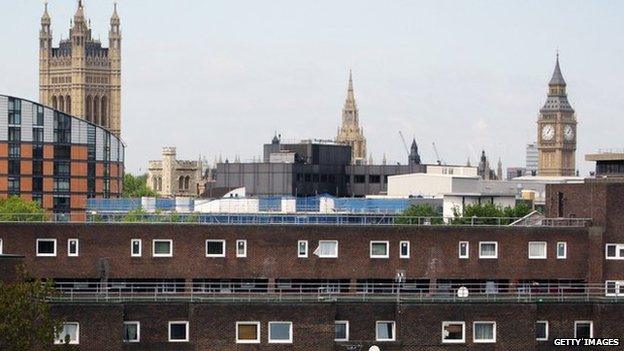Council tax benefit changes 'perverse', says committee
- Published

Changes to council tax benefit have weakened work incentives for "up to 225,000 people" in England, a committee of MPs has said.
The public accounts committee said that some people stand to lose as much as 97p out of every extra pound they earn.
Committee chair and Labour MP Margaret Hodge said the outcome was "fundamentally perverse" and the opposite of the government's intention.
But ministers said they were "fixing the welfare system to make work pay".
In its latest report, external, the committee noted that council tax benefit cost taxpayers £4.3bn in 2011-12, when it was administered nationally.
'Work doesn't pay'
But in April 2013, responsibility was transferred to 326 local authorities in England, with the government providing funding of £3.7bn - a cut of £414m, or 10% of the predicted total budget had the system remained unchanged, the MPs said.
Some 71% of councils - 230 in all - required all working-age claimants to make at least a minimum contribution to their council tax bill.
In 19 local authorities, representing 225,000 working-age claimants in England, the "taper rate", at which support is reduced as income rises, was increased from 20% under the old system - 14 of them increasing it to 25% and four to 30%.
The MPs explained that the impact of increases in the taper rate meant that, when the withdrawal of council tax benefit was combined with the loss of housing benefit and increased income tax and national insurance payments, claimants taking on additional work lost 93p out of every extra pound they earned on a 25% rate or 97p on a 30% rate.
Ms Hodge said: "This just goes to show, for some, work simply doesn't pay under the new scheme. For them, work incentives have actually weakened rather than strengthened - the opposite of what the government intended.
"Some of those 225,000 people stand to lose 97p for every extra £1 earned - a fundamentally perverse result."
'Something for nothing'
The Local Government Association's Sharon Taylor said: "The shortfall between the money councils receive to fund council tax support and the money we would need to protect those on low incomes is getting bigger and is likely to reach £1bn by 2016.
"At the same time, councils are tackling the biggest cuts in living memory and cannot afford to make up the difference.
"Government should consider giving local authorities the full amount of funding needed to provide council tax support and ensure that decisions over council tax and discounts are fully localised."
But local government minister Brandon Lewis said: "Spending on council tax benefit doubled under the last government costing taxpayers £4bn a year - equivalent to almost £180 a year per household.
"That's why, as part of our long-term economic plan, we are fixing the welfare system to make work pay and reducing the deficit to safeguard our economy for the long term."
He added: "Our council tax policies are working. Localised council tax support has also given councils stronger incentives to support local firms, cut fraud, promote local enterprise, get people into work and end the 'something-for-nothing' culture."